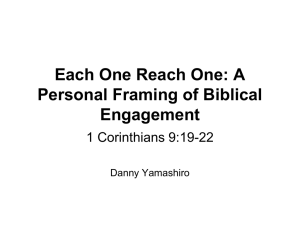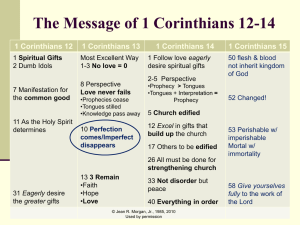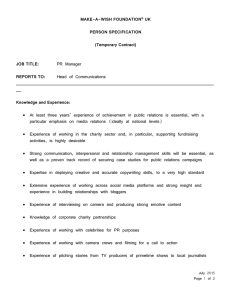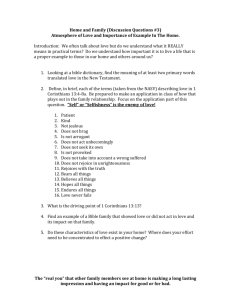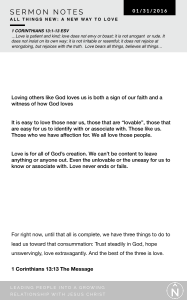DOCX
advertisement
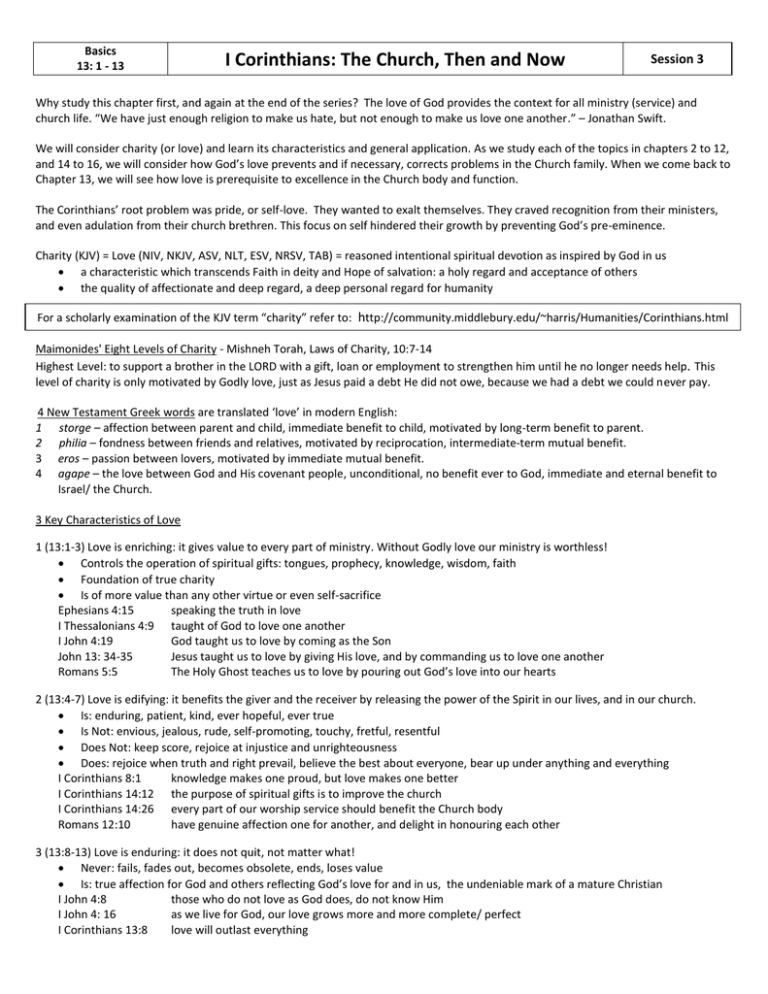
Basics 13: 1 - 13 I Corinthians: The Church, Then and Now Session 3 Why study this chapter first, and again at the end of the series? The love of God provides the context for all ministry (service) and church life. “We have just enough religion to make us hate, but not enough to make us love one another.” – Jonathan Swift. We will consider charity (or love) and learn its characteristics and general application. As we study each of the topics in chapters 2 to 12, and 14 to 16, we will consider how God’s love prevents and if necessary, corrects problems in the Church family. When we come back to Chapter 13, we will see how love is prerequisite to excellence in the Church body and function. The Corinthians’ root problem was pride, or self-love. They wanted to exalt themselves. They craved recognition from their ministers, and even adulation from their church brethren. This focus on self hindered their growth by preventing God’s pre-eminence. Charity (KJV) = Love (NIV, NKJV, ASV, NLT, ESV, NRSV, TAB) = reasoned intentional spiritual devotion as inspired by God in us a characteristic which transcends Faith in deity and Hope of salvation: a holy regard and acceptance of others the quality of affectionate and deep regard, a deep personal regard for humanity For a scholarly examination of the KJV term “charity” refer to: http://community.middlebury.edu/~harris/Humanities/Corinthians.html Maimonides' Eight Levels of Charity - Mishneh Torah, Laws of Charity, 10:7-14 Highest Level: to support a brother in the LORD with a gift, loan or employment to strengthen him until he no longer needs help. This level of charity is only motivated by Godly love, just as Jesus paid a debt He did not owe, because we had a debt we could never pay. 4 New Testament Greek words are translated ‘love’ in modern English: 1 storge – affection between parent and child, immediate benefit to child, motivated by long-term benefit to parent. 2 philia – fondness between friends and relatives, motivated by reciprocation, intermediate-term mutual benefit. 3 eros – passion between lovers, motivated by immediate mutual benefit. 4 agape – the love between God and His covenant people, unconditional, no benefit ever to God, immediate and eternal benefit to Israel/ the Church. 3 Key Characteristics of Love 1 (13:1-3) Love is enriching: it gives value to every part of ministry. Without Godly love our ministry is worthless! Controls the operation of spiritual gifts: tongues, prophecy, knowledge, wisdom, faith Foundation of true charity Is of more value than any other virtue or even self-sacrifice Ephesians 4:15 speaking the truth in love I Thessalonians 4:9 taught of God to love one another I John 4:19 God taught us to love by coming as the Son John 13: 34-35 Jesus taught us to love by giving His love, and by commanding us to love one another Romans 5:5 The Holy Ghost teaches us to love by pouring out God’s love into our hearts 2 (13:4-7) Love is edifying: it benefits the giver and the receiver by releasing the power of the Spirit in our lives, and in our church. Is: enduring, patient, kind, ever hopeful, ever true Is Not: envious, jealous, rude, self-promoting, touchy, fretful, resentful Does Not: keep score, rejoice at injustice and unrighteousness Does: rejoice when truth and right prevail, believe the best about everyone, bear up under anything and everything I Corinthians 8:1 knowledge makes one proud, but love makes one better I Corinthians 14:12 the purpose of spiritual gifts is to improve the church I Corinthians 14:26 every part of our worship service should benefit the Church body Romans 12:10 have genuine affection one for another, and delight in honouring each other 3 (13:8-13) Love is enduring: it does not quit, not matter what! Never: fails, fades out, becomes obsolete, ends, loses value Is: true affection for God and others reflecting God’s love for and in us, the undeniable mark of a mature Christian I John 4:8 those who do not love as God does, do not know Him I John 4: 16 as we live for God, our love grows more and more complete/ perfect I Corinthians 13:8 love will outlast everything Basics 13: 1 - 13 I Corinthians: The Church, Then and Now Session 3 Discussion Group: Referring to I Corinthians 13:1-13, answer questions 1 to 6. 1 To what is speaking in tongues without love compared? (v1) 2 What 4 spiritual gifts are valueless without love? (v2) 3 What 2 devotions are worthless without love? (v3) 4a What are the positive characteristics of charity?(v4,6,7) 4b What are the things that charity is not or does not? (v5,6,8) 4c What 3 things will fail while charity endures?(v8) 5a What makes a Christian perfect (complete)?(v8-12) 5b What 2 things cannot make a Christian perfect (complete)?(9,10) 6 What 3 things will abide? (v13) Take Home: Personal Reflection and Application Read I Corinthians 13: 4-7, substituting your own name for ‘charity’. 7a Which quality of love do you think is incomplete in your life? 7b What is an example of this immaturity? 7c What 3 things will you do this week to improve in this area? Take Home: Personal Preparation for Next Class: Foolishness Read I Corinthians 1:10–1:31 and answer questions 8 and 9. 8 How does expressing gratitude to God contribute toward unity in the local church? 9 How does the message of the cross destroy boasting in worldly wisdom?
